Bearded dragons are fascinating creatures that have gained popularity as pets. However, their unique dietary requirements often leave owners wondering how long these reptiles can go without eating. This article, How Long Can a Bearded Dragon Go Without Eating, will provide insight into the dietary needs of bearded dragons and discuss the factors that contribute to their survival ability without food for certain periods.
Q: Is it normal for a bearded dragon to go without eating during brumation?
A: Yes, it is normal for bearded dragons to reduce or cease their food intake during brumation. Brumation is a natural process where their metabolism slows down, and they enter a state of dormancy. During this time, they rely on their fat stores for energy.
How Long Can a Bearded Dragon Go Without Eating: Explained
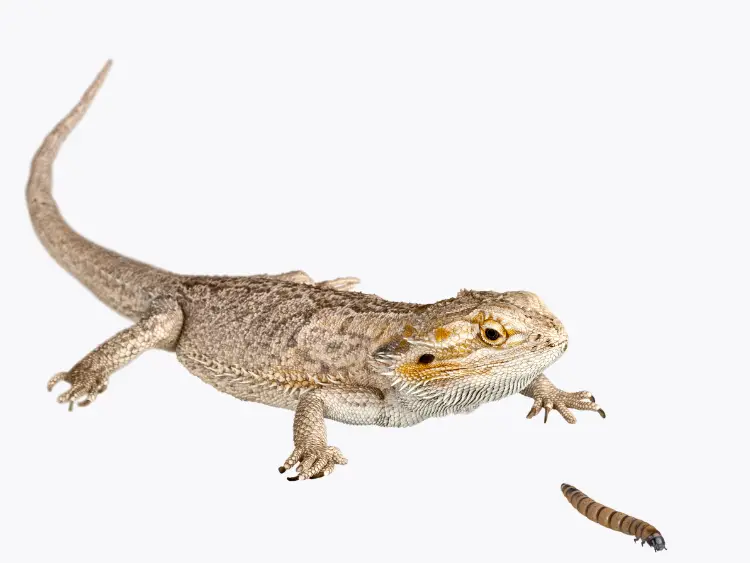
The duration a bearded dragon can go without food largely depends on its age and health. For instance, adult beardies with extra weight to lose can go up to 2 months or longer without food, although this is far from optimal.
On the other hand, young dragons who need nutrients from their food for adequate growth and nutrition cannot go as long without sustenance.
It is crucial for bearded dragon owners to understand the feeding schedule specific to their dragon’s age group. For example, baby dragons need 2-3 feedings daily, while adult dragons can be fed once or every other day. By understanding the dietary needs of bearded dragons, owners can ensure their pets remain healthy and thrive in captivity.
Bearded Dragon Basics
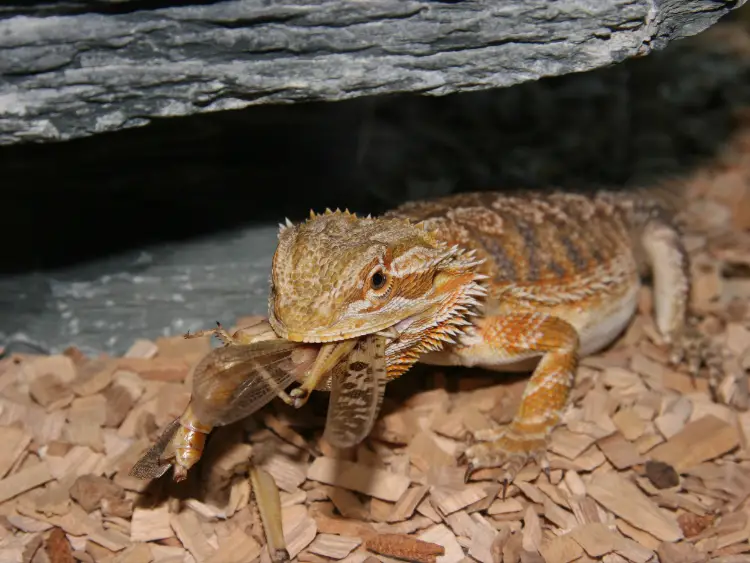
Age and Life Stage
Bearded dragons are reptiles belonging to the Pogona genus and are popular pets due to their manageable size and friendly nature. Their life stages can be divided into three main categories:
- Baby bearded dragons: From 0 to 5 months old
- Juvenile bearded dragons: From 6 to 17 months old
- Adult bearded dragons: 18 months and older
As bearded dragons mature, their dietary and environmental needs change. It is essential to understand these needs to ensure their health and well-being.
Habitat and Environment
Bearded dragons are native to the arid deserts of Australia and require a specific environment to thrive. Here are some considerations for their habitat:
- Heat: Maintain a basking spot with temperatures ranging from 95°F to 110°F. The cooler region of the enclosure should be around 75°F to 80°F.
- UV Lighting: Provide 10-14 hours of UVB light daily to help them synthesize Vitamin D and absorb calcium.
- Space: An adult bearded dragon should have an enclosure of at least 40-55 gallons to ensure adequate room for movement and exploration.
- Substrate: Choose a low-risk substrate, like a reptile carpet or newspaper, to avoid impaction issues.
Diet and Nutrition
A bearded dragon’s diet consists of a mix of insects, vegetables, and fruits. Their nutritional requirements vary depending on their age:
- Baby bearded dragons: Should have a diet consisting of 70% insect protein and 30% plant matter.
- Feed 3-5 times a day, offering as many insects as they can eat in a 5-10 minute time frame.
- Offer finely chopped vegetables daily.
- Juvenile bearded dragons: Should have a diet consisting of 60% insect protein and 40% plant matter.
- Feed 2-3 times a day, allowing them to eat as many insects as they can in a 5-10 minute time frame.
- Offer chopped vegetables daily.
- Adult bearded dragons: Should have a diet consisting of 30% insect protein and 70% plant matter.
- Feed insects 2-3 times a week and offer fresh vegetables daily.
Insects like crickets, locusts, and dubia roaches provide essential protein, while leafy greens like collard greens, dandelion greens, and mustard greens are excellent sources of vitamins and minerals.
Be sure to gut-load the insects and dust them with calcium and multivitamin supplements to ensure a well-rounded diet.
Factors Affecting Food Intake
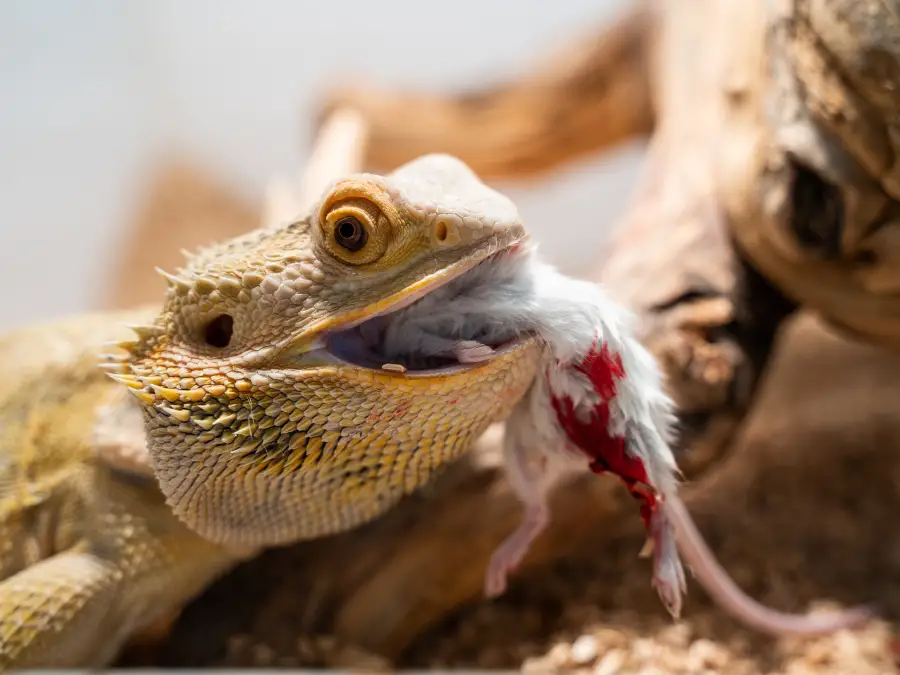
There are several factors that can affect a bearded dragon’s food intake, including brumation and hibernation, stress and illness, and environmental conditions. These factors can have varying impacts on how long a bearded dragon can go without eating.
Brumation and Hibernation
Brumation is a natural process in which bearded dragons enter a state of dormancy during the cooler months. Their metabolism slows down during this period, and they may not eat for several weeks. This is distinct from hibernation, which some animals undergo in response to cold temperatures.
While a mature bearded dragon may go up to 2 months without food during brumation, monitoring their weight and overall health is essential to ensure they are not experiencing significant weight loss or other issues.
Stress and Illness
Stress and illness can negatively impact a bearded dragon’s appetite and ability to eat. Health issues such as parasites, respiratory infections, or impaction can lead to a loss of appetite and may cause the dragon to stop eating.
If your bearded dragon shows signs of stress or illness, consult a veterinarian as soon as possible. It’s crucial to address these issues early to prevent further complications, as a weakened bearded dragon may be unable to go for extended periods without eating.
Environmental Conditions
Proper environmental conditions are essential for bearded dragons to thrive and maintain a healthy appetite. Temperature and humidity are critical factors influencing their ability to eat.
- Temperature: Bearded dragons need a temperature gradient in their enclosure, with a basking spot between 95-110°F (35-43°C) and a cool side ranging from 75-85°F (24-29°C).
- Humidity: Humidity levels should be kept between 30-40%. Too high or too low humidity can cause dehydration or respiratory issues, affecting the dragon’s eating habits.
Ensuring optimal environmental conditions will help maintain a healthy appetite in your bearded dragon and allow them to go without food for several days if needed comfortably.
It’s essential to monitor your bearded dragon’s eating habits and promptly address any changes in their behavior. The factors discussed here can significantly affect how long a bearded dragon can go without eating, so understanding and managing these factors will contribute to your pet’s well-being.
Common Bearded Dragon Care Mistakes: Watch this
Food and Feeding Habits
Types of Food
Bearded dragons have a varied diet, which comprises both animal protein and plant matter. Their primary protein source comes from insects, such as crickets, mealworms, and roaches. These insects should be gut-loaded and dusted with calcium powder to ensure proper nutrition.
Besides insects, bearded dragons also consume a range of greens, vegetables, and fruits. Some suitable greens include collard greens, turnip greens, and dandelion greens.
Vegetables like bell peppers, squash, and carrots can also be fed, while fruits such as strawberries, blueberries, and apples are good options in moderation.
Here’s a simple breakdown of their diet:
- Insects: Crickets, mealworms, roaches
- Greens: Collard greens, turnip greens, dandelion greens
- Vegetables: Bell peppers, squash, carrots
- Fruits: Strawberries, blueberries, apples
Feeding Frequency
Feeding a bearded dragon depends on its age and health. For instance, baby bearded dragons need frequent meals throughout the day to support their rapid growth, whereas adult dragons can be fed once every two to three days.
Here is a general guideline for feeding frequencies:
- Babies: 3-5 times a day
- Juveniles: 1-2 times a day
- Adults: Every 2-3 days
Note: this is not a strict guideline and individual feeding requirements may vary depending on the dragon’s health and activity levels.
Adapting to a New Diet
When introducing a new diet or food item to a bearded dragon, it is important to do it gradually to avoid digestive issues. Start by mixing the new food with their existing diet, gradually increasing the proportion of the new food over time.
Additionally, monitor your bearded dragon’s behavior and appetite during the transition. If they show any signs of stress or digestive problems, such as loss of appetite or diarrhea, you may need to adjust the new diet accordingly.
Remember that bearded dragons have their own preferences, and it might take some time to identify the food items that they enjoy the most. But with patience and a steady adaptation process, they will eventually get used to their new diet.
Signs of Distress
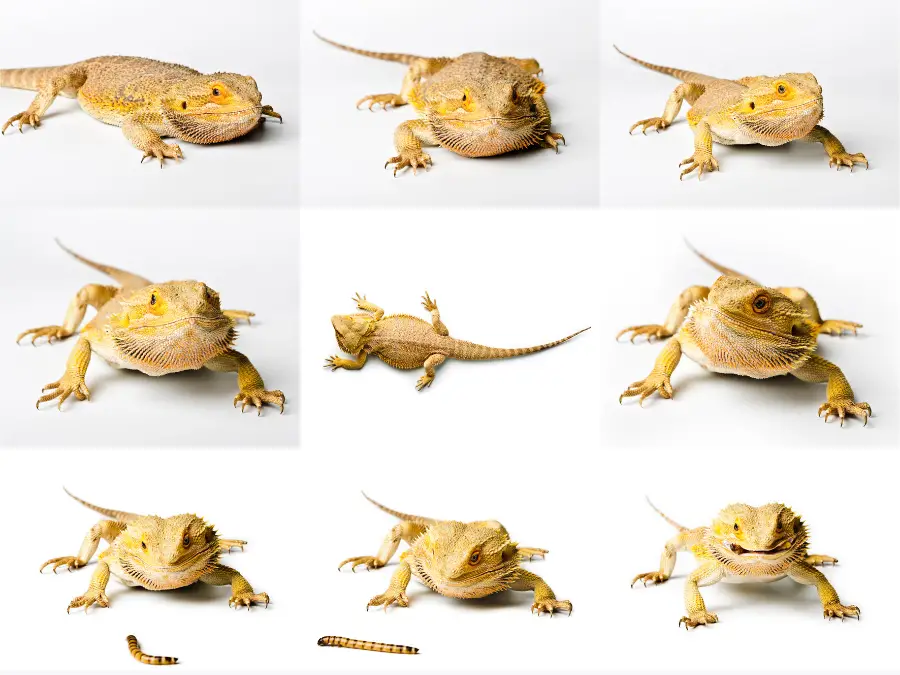
Appetite Loss and Refusal to Eat
A common sign of distress in bearded dragons is appetite loss, which a variety of factors such as stress, illness, or inadequate living conditions can cause. If you observe your bearded dragon refusing to eat, try offering a variety of food options, including insects or fruits that are considered treats.
If there is still no improvement, consider checking the temperature and lighting conditions of the terrarium, as these can significantly impact your bearded dragon’s overall well-being.
Dehydration and Weight Loss
Dehydration and weight loss are also signs of distress in bearded dragons. Ensure your pet has access to fresh, clean water and that its living environment is not too dry. You can provide water through a shallow dish or use a drip system.
To prevent dehydration, monitor weight change in your bearded dragon, as significant weight loss may indicate that it is not getting enough nutrients or water. Take note of any signs of dehydration, such as sunken eyes or wrinkled skin, and consult with a veterinarian if needed.
Lethargy and Discomfort
Lethargy and discomfort may be observed in bearded dragons that are experiencing distress. These signs can be caused by a variety of factors, ranging from illness to improper housing conditions. Bearded dragons are usually quite active, so any changes in activity level should be taken seriously.
Ensure the basking area temperature is between 90 to 110°F, which will help keep your pet comfortable and active. Additionally, monitor the overall behavior of your bearded dragon and consult with a veterinarian if you observe any unusual symptoms.
Potential Health Issues
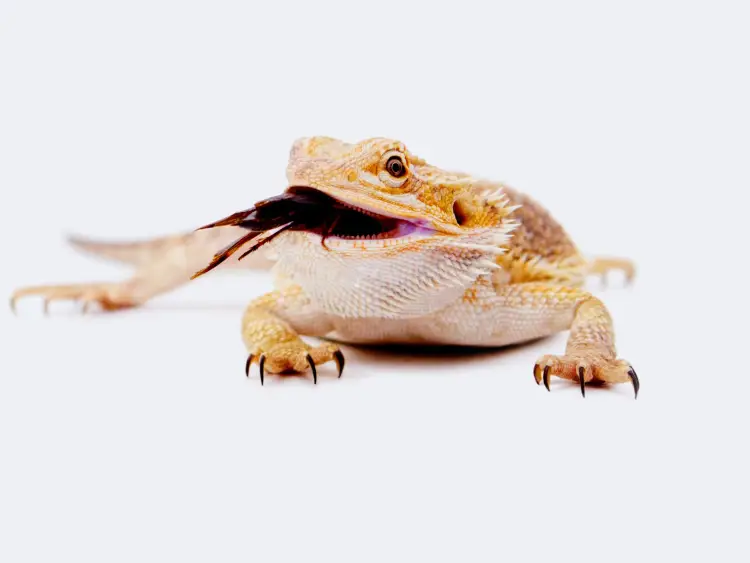
Bearded dragons can face various health issues if they go without food for extended periods. This section will discuss three primary concerns: impaction and bowel movements, parasites and infections, and metabolic bone disease.
Impaction and Bowel Movements
Impaction is a common issue in bearded dragons and refers to the build-up of undigested food or foreign materials in the digestive system. This can cause discomfort, loss of appetite, and potentially severe health problems.
A bearded dragon that has not had a bowel movement in an extended period might be experiencing impaction. Maintaining a proper diet and providing access to a clean environment can help prevent impaction and encourage healthy bowel movements.
Parasites and Infections
A bearded dragon can develop internal and external parasites when their immune system is compromised, such as during periods of inadequate nutrition. Parasites like pinworms, coccidia, and mites can negatively impact your bearded dragon’s health, leading to illness and, in severe cases, death.
Keeping a clean environment and ensuring a balanced diet are crucial in preventing parasites and infections. If you suspect a parasite or infection, consult a veterinarian immediately for proper diagnosis and treatment.
Metabolic Bone Disease
Metabolic Bone Disease (MBD) is a condition that affects the skeletal system of bearded dragons. It is usually the result of nutritional deficiencies, such as insufficient calcium and vitamin D intake. A bearded dragon that goes without food for an extended period may become more susceptible to diseases like MBD.
To prevent MBD, provide your bearded dragon with a well-balanced diet and appropriate supplements. Additionally, ensure proper UVB lighting in their habitat to help in the synthesis of vitamin D, which aids in calcium absorption.
Seeking Professional Help
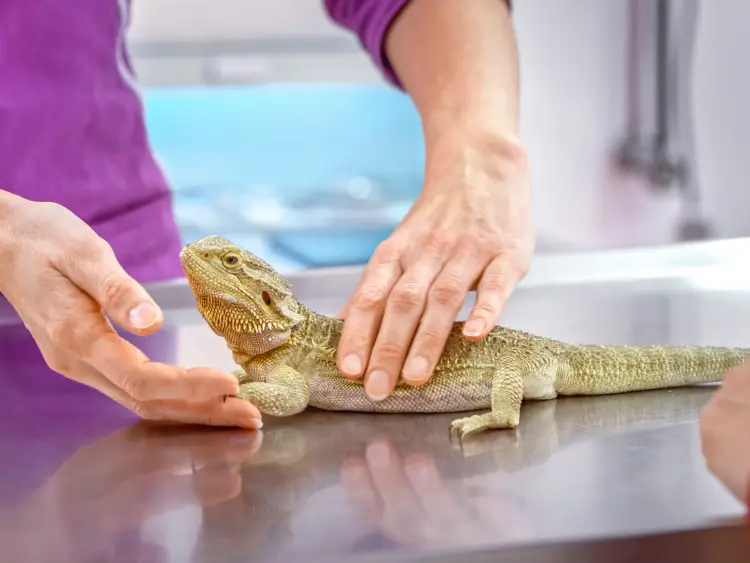
When to Consult a Vet
While bearded dragons can go up to 2 months without food if they are healthy adults, it is not encouraged behavior. Making sure your bearded dragon is eating regularly should be a top priority of any owner.
There are several signs that indicate it may be time to consult a veterinarian for your pet:
- Prolonged lack of appetite or weight loss
- Difficulty breathing, wheezing, or coughing
- Swelling, lumps, or sores on the body
- Lethargy or weakness
- Changes in stool consistency, color, or frequency
Knowing when to consult a vet is crucial for the health and well-being of your bearded dragon.
Reptile Vets and Diagnostics
There are several reasons why your bearded dragon might not be eating, and it’s essential to consult a reptile veterinarian to get a proper diagnosis. Reptile vets are trained in treating the specific needs of bearded dragons and other reptiles.
To find the best reptile vet, consider asking for recommendations from fellow bearded dragon owners or seeking advice from local herpetological societies.
Once you have chosen a reptile vet, they may perform various diagnostic tests to identify the problem, such as:
- Bloodwork – to evaluate overall health and check for signs of infection or metabolic issues
- Fecal examination – to check for signs of parasites or abnormal bacteria
- Radiographs (X-rays) – to identify any structural abnormalities or foreign objects
- Ultrasound or CT scans – to evaluate internal organs and detect tumors or other abnormalities
Through these diagnostics, your reptile vet will provide the necessary treatment and care recommendations to address any issues and ensure your bearded dragon returns to a healthy state.
Remember, prevention should always be the first line of defense when caring for your bearded dragon. Providing a proper diet, a safe and clean environment, and appropriate UVB lighting are all crucial aspects of maintaining your bearded dragon’s health.
By attentively monitoring your pet and seeking professional help when needed, you can ensure your bearded dragon remains strong and healthy throughout its life.
Maximizing Health and Survival
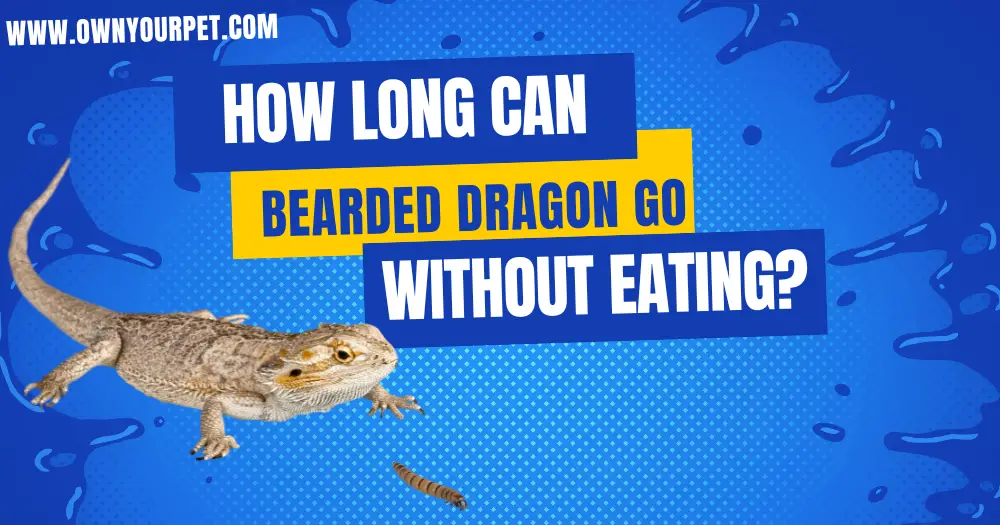
Proper Nutrition and Supplements
A bearded dragon’s diet should be well-rounded and cater to its needs according to its age and life stage. Baby bearded dragons are in a rapid growth phase and require multiple feedings per day, while adult bearded dragons can consume less frequent meals.
Always ensure that these lizards have access to fresh water, as dehydration can rapidly become a serious issue. Never let young bearded dragons go for more than 24 hours without food.
In addition to a balanced diet containing insects and vegetables, bearded dragons benefit from appropriate supplementation. Calcium and vitamin D3 are essential for maintaining good health, as they work together to strengthen bones and prevent metabolic bone disease.
Dust insects with calcium powder and provide a separate source of vitamin D3. Make sure not to over-supplement, as doing so may lead to toxicity.
Creating an Optimal Environment
An essential aspect of bearded dragon care is creating a suitable environment that promotes healthy metabolism and well-being. Achieving proper temps in their enclosure supports various metabolic processes, while proper UVB light exposure assists in calcium absorption and overall good health. Be sure that the humidity in the enclosure remains within appropriate levels.
A UVB light source should be provided for bearded dragons, replacing the bulb every six months to maintain efficiency. The enclosure should also have a proper heat gradient, ranging from a basking area with temperatures around 95-110°F (35-43°C) to a cooler area with temperatures around 75-80°F (24-27°C).
Monitoring and Adjustments
Regularly monitor your bearded dragon’s weight, activity level, and behavior, making necessary adjustments to their diet and surroundings as needed.
Adult bearded dragons can survive up to two months without food if they have enough fat stores and water intake, but this scenario should be avoided in order to maintain their health in captivity.
Keep track of their growth and weight to ensure adequate nutrition. Observe any changes in their eating habits, energy levels, or general demeanor, as these can be indications of potential health issues. Consult with a reptile veterinarian if you notice any problems or have concerns regarding your bearded dragon’s health.
Maintaining optimal nutrition, environment, and monitoring are crucial for improving the longevity and overall quality of life for your bearded dragon, ensuring they remain healthy and active throughout its life in captivity.
By paying close attention to these factors, you can effectively minimize the risk of illness and maximize the time your bearded dragon can go without food, should the need arise.
